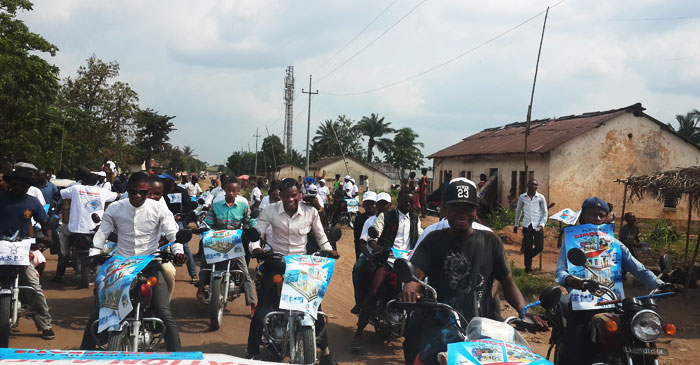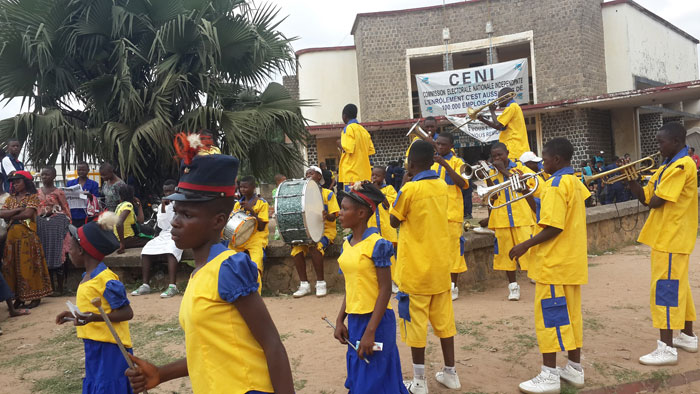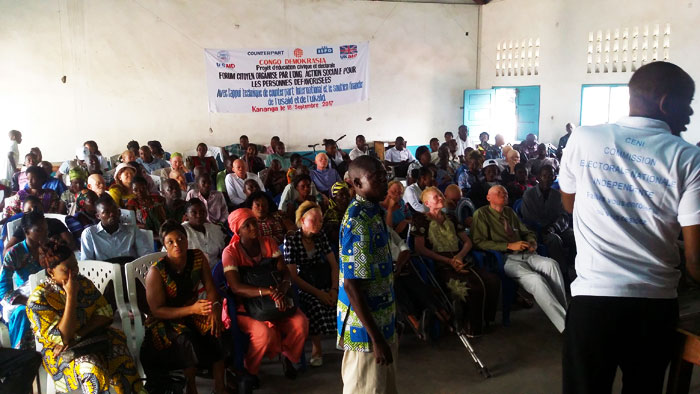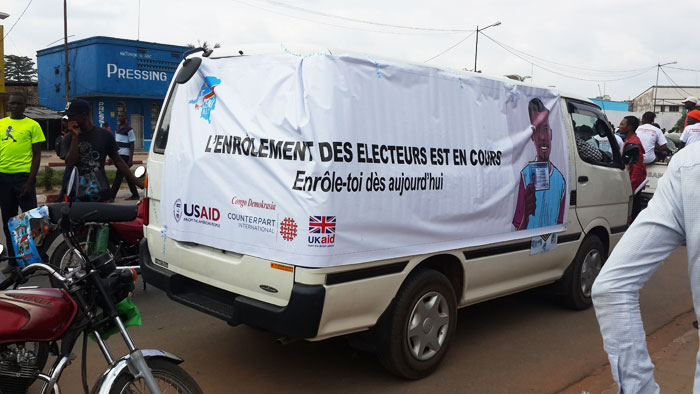Dispatch from Counterpart’s Congo Demokrasia program in Kasai Central, The Democratic Republic of Congo (DRC)
By Steven Sharp, Chief of Party for Counterpart International in the DRC, and Stephanie Benedict
With a revving of motorcycle engines, the voter registration caravan rolled out from the election commission headquarters onto Avenue Claudel Lubaya in Kananga, the capital city of Kasai Central province. The noise brought hundreds of local residents out to the curb to witness the spectacle. The caravan criss-crossed the neighborhoods of Kananga, with megaphone-wielding ‘criers’ calling on the people to register to vote. For several hours, community groups in the caravan vehicles handed out more than 20,000 informative flyers to people along the way.

The Congo Demokrasia voter registration caravan in Kananga spread the word of the DRC’s upcoming elections with colorful posters and noisy motorcycles.
The launch of the Kasai voter registration caravan was cause for celebration in the community and for Counterpart’s local partners who work to improve the effectiveness of voter registration activities. When the DRC Commission Electorale Nationale Indépendante (CENI) originally started the voter registration drive in the central DRC in May, the two western provinces of Kasai and and Kasai Central were excluded from the campaign due to widespread security concerns, including the destruction of public and church buildings in a number of parishes. Local CENI offices had been vandalized, and one of the independent election agents was killed. Nearly one million Kasai residents were displaced from their homes because of the violence.
Counterpart International advised its two Congo Demokrasia partners in the Kasai city of Kananga, Centre D’Actions Pour La Promotion Sociale De Masuika (CAPSM) and Association Pour Le Development Socioeconomique Du Kasai (ADSKA), to monitor security conditions on a daily basis and to temporarily suspend operations.
Fortunately, a combined security operation and political outreach and mediation effort convinced the CENI in September that conditions had improved sufficiently to allow the re-opening of registration centers in the two provinces. Counterpart’s regional office in Mbuji Mayi sent a team to Kananga to work with the provincial branch of the CENI to organize a voter registration caravan to coincide with the launch of voter registration in Kasai. Counterpart also partnered with local civil society groups to plan three citizen forums to provide information to historically marginalized communities about the voter registration process. At the same time, Counterpart Kinshasa launched a three-month radio campaign informing citizens about the opportunity to register to vote.

Celebrations surround the Congo Demokrasia voter registration caravan in Kananga, September 2017.
“It was a fantastic idea to organize this citizen forum in this town that was the most affected by the violence,” said Joseph Mputu, the Provincial CENI Executive Secretary, at a Kananga citizen forum on September 22. “Finally, with this activity, the local residents understand how important registering voters and participating in the electoral process is to preserving the peace,” he added.

Congo Demokrasia citizen forum in Kananga, September 18.
New Election Date Offers Opportunity for Citizen Voice
The DRC is emerging from decades of conflict. After a controversial national election in 2011 and a repeatedly delayed timeline for new elections, CENI recently made the long-awaited announcement that new elections will take place in December 2018. With this announcement, the Congolese people are more eager and organized than ever to make their voices heard in a credible democratic election. Voter education forums and registration drives are critical to help citizens of this young democracy learn why their vote matters and how to vote.
More than two million DRC citizens across 20 provinces have been reached by Congo Demokrasia caravans and by radio public service announcements encouraging people to attend citizen forums.
Congo Demokrasia, a Counterpart project funded by USAID in collaboration with UKAid, works across 20 provinces in the DRC to build the capacity of local organizers to increase citizen engagement in the political process. Focusing on the engagement of women, youth, religious minorities, and indigenous populations, Congo Demokrasia aims to help citizens know their civic rights and exercise their right to vote.

Promoting voter registration at the Congo Demokrasia caravan in Kananga, September 2017.




